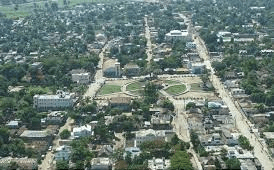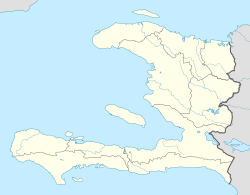Ouanaminthe facts for kids
Quick facts for kids
Ouanaminthe
Wanament / Wanamèt / Juana Méndez
|
|
|---|---|
|
Commune
|
|

Aerial view
|
|
| Country | Haiti |
| Department | Nord-Est |
| Arrondissement | Ouanaminthe |
Ouanaminthe (also called Haitian Creole: Wanament or Spanish: Juana Méndez) is an important town in Haiti. It is located in the Nord-Est department. The town sits right on the Massacre River. This river forms part of the border between Haiti and the Dominican Republic.
Ouanaminthe is the biggest town in northeastern Haiti. It is also the largest in the Nord-Est Department. A bridge connects Ouanaminthe to the Dominican city of Dajabón. This bridge is one of the four main ways to cross the border between the two countries. For a long time, Ouanaminthe has been a place where disagreements between countries were settled. This happened first between French and Spanish colonists. Later, it was part of the Haitian-Dominican conflict.
About 100,000 people live in Ouanaminthe and the areas nearby. People from Ouanaminthe can cross the border to Dajabón without special papers two days a week. This is usually for the market on Mondays and Fridays. There, they buy and sell many different goods. In 2010, a new bridge and market building opened. The European Union helped pay for these improvements.
Contents
What's in a Name?
The name Ouanaminthe comes from a much older word. It is the French version of Guanaminto. This was the name of the native village that was here before Europeans settled. The local Haitian Creole name, Wanament, is simply the Creole way of saying the French name. In Dominican Spanish, the town is called Juana Méndez.
Learning in Ouanaminthe
Ouanaminthe has many schools. Most of them are connected to churches. There are several elementary schools, like St-Francois Xavier and Collège Oswald Durant. Some other primary schools include Collège Georges Muller and St-Francois d'Assise.
The town also has over 10 secondary schools. These include a lycée (a type of high school) and a public school. There is also a public law school for university students. The Lycée Capois La Mort, a well-known school, has moved to a new location.
Haiti's school system has four main parts:
- Kindergarten
- Primaire / primary school (like 1st to 6th grade in the U.S.)
- Secondaire / secondary school (like 7th to 11th grade in the U.S., plus two more years)
- Université / university
Currently, five new primary schools are being built. Groups like Foi et Joie (Faith and Joy) and Solidaridad Fronteriza are helping to fund them.
The main language spoken in Ouanaminthe is Creole (Kreyòl). French is also an official language of Haiti and is used.
Getting Around Town
Most people travel around Ouanaminthe by scooter or motorcycle. Many roads are dirt roads with lots of potholes, except for the main streets. There is also a bus station in town for travel within the city.
Health and Medical Care
Ouanaminthe and Dajabon both have hospitals. However, there are no details about their official certifications or hours. It is important to know that getting medical help in this area can be challenging. There is no 911 service, and Haiti does not have an ambulance service. The fire department in Dajabon does run an ambulance service.
How Ouanaminthe Makes Money
Canada recently helped by paying for the police station to be updated.
The main way the town earns money is through trade with its neighbor, Dajabon. In 2015, Haiti made a rule to help its own businesses. It stopped 23 items, like bottled water and spaghetti, from being brought into the country by truck. This was to encourage local production.
Sports in Ouanaminthe
Ouanaminthe is home to its own sports team, the Ouanaminthe FC.
Travel and Transportation
The Route Nationale #6 is a major road that connects Cap Haitien to Ouanaminthe. It also links to the Dominican border town of Dajabon. This road passes through the towns of Limonade and Terrier Rouge. Ouanaminthe also has a small airport called Ouanaminthe Airport.
Parts of Ouanaminthe
The town of Ouanaminthe is divided into five main parts, called communal sections. All of these areas are considered rural:
- Haut Maribahoux
- Acul des Pins
- Savane Longue
- Savane au Lait
- Gens de Nantes
Famous People from Ouanaminthe
Many notable people have connections to Ouanaminthe:
- Jean Alfred (1940-2015) was a teacher and politician from Haiti and Canada. He was a member of the National Assembly of Quebec.
- Elisma Florvil was a lawyer and a former Haitian Congressman. He also served as a judge in Ouanaminthe.
- Pepé Bayard (1945-2008) was a famous accordion player. He also created the well-known "Pepé Bayard shirt".
- Marie-Louise Coidavid (1778-1851) was the wife of King Henri I of Haiti.
- Jean-Baptiste Dureau de la Malle (1742-1807) was a French writer and translator.
- Nesmy Manigat is an economist. He served as the Minister of National Education and is part of the Global Partnership for Education.
- René Theodore (1941-2003) was an activist and politician. He was a former leader of the Unified Party of Haitian Communists.
See also
 In Spanish: Juana Méndez para niños
In Spanish: Juana Méndez para niños
 | Aurelia Browder |
 | Nannie Helen Burroughs |
 | Michelle Alexander |


